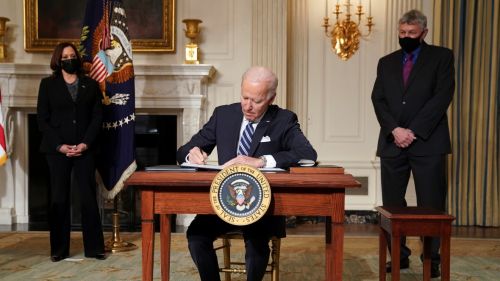What the New Executive Orders on Climate Mean for Global Food Security

Gloria Dabek and Alyssa Kreps examine how integrating a climate lens into foreign policy and national security will have ripple effects on both domestic and global food security.
As the Biden Administration has transitioned to power with margins favoring Democrats only narrowly in both the House and Senate, the Administration has harnessed executive action to further President Biden’s climate agenda. The Administration kickstarted this process when President Biden established a Special Envoy for Climate Change position, appointed John Kerry, and added that position to the National Security Council. While this is a promising initial link between climate and national security, the scope of this position’s, work as well as how it will fit in with President Biden’s other executive action, remains to be decided. Over the last several weeks, President Biden has rolled out a historic number of wide-reaching executive orders (EOs), or directives from the President that do not need Congressional approval. Biden’s “Executive Order on Tackling the Climate Crisis at Home and Abroad” articulates a number of policies that the new Administration will take as first steps toward addressing climate issues, notably steps in raising climate change as a foreign policy and national security priority. If implemented successfully, these policies can also further US government global food security efforts. While the EO does not explicitly mention food security, integrating a climate lens into foreign policy and national security will have ripple effects on both domestic and global food security.
The EO reflects research and policy recommendations made by the Chicago Council’s Center on Global Food and Agriculture over the past 10 years. Most recently, the Council brief, New Solutions for a Changing Climate, examines how intensifying temperatures, extreme weather events, and pests and diseases as a result of climate change wreak havoc on food security, and how it requires new US resources to match the urgency for tackling climate change.
Inclusion of climate as a national security priority
The EO explicitly declares climate change as a critical element of foreign policy and national security. This connection has gradually developed as the national security community studied the interplay between climate and security over the past decade, including the impact of climate change on military bases. The linkage extends to the security of food systems as well. As noted in the jointly authored Council and Farm Journal Foundation brief Farmers on the Front Line: Agriculture’s Role in Fighting Climate Change, many global pests and diseases have been exacerbated by intensifying and extreme weather, threatening crops, livestock, and even people on global and domestic scales. For example, locust swarms decimated croplands throughout East Africa in 2019 and 2020. This can be traced back to warming oceans that increased the frequency and intensity of tropical cyclones and rainfalls, which resulted in moist soil conditions, perfect for locusts to develop and breed. The locust swarms devastated smallholder farmers across the region, putting millions at risk for starvation. While the US was not directly affected by these swarms, the US food system is indelibly connected to our global food system; the security of our entire food systems are threatened by climate change and its consequences. Ensuring climate issues factor into national security strategy, as this executive order directs, elevates climate change to the threat it is, to all aspects of life, food security in particular.
Forewarned is forearmed
The EO also directs the Director of National Security to prepare a National Intelligence Estimate (NIE) on security implications of climate change. NIEs constitute the most formal and coordinated tool for the intelligence community to evaluate likely outcomes on a particular topic. Recent electric grid failures in Texas, for example, illustrate how increased extreme weather events from climate change pose urgent national security threats, such as loss of access to emergency services and supplies, and heightened vulnerability to cyberattacks. While many of the security implications of climate change are already apparent, involving the US national security sector in analyzing these implications is an important step. This is not just a factor for disasters within US borders, but can also help drive our foreign assistance planning and military deployment. Incorporating climate issues in national security concerns and understanding food security implications can better drive global stability by tracking a major factor that drives conflict. Climate change causes or exacerbates food insecurity, and prolonged or acute food insecurity can often result in political turmoil. Using a national security lens to examine food security also alters how we react. Rather than primarily responding to the problem of food insecurity with humanitarian aid, we can also leverage more preventative intelligence, acting in both US and global interest to address regions at risk of food insecurity. The Council’s report Stability in the 21st Century further explores the circular and complicated relationship between these themes.
Where do we go from here?
President Biden’s recent EO is an initial attempt to unite the climate, foreign policy, and national security communities to address the urgent climate crisis. Integrating climate into general US policy is a positive first step and it is an important move for breaking down government silos to better combat food insecurity. However, it remains unclear how precisely the Administration will incorporate climate specifically into food and nutrition security issues. With this new blog series, The Council will continue to monitor the new Administration’s implementation of this executive order, as well as future integration of climate policy.
Delivery from the District
This post is a part of our "Delivery from the District" blog series, which analyzes the implications of executive and legislative policy on global food security.